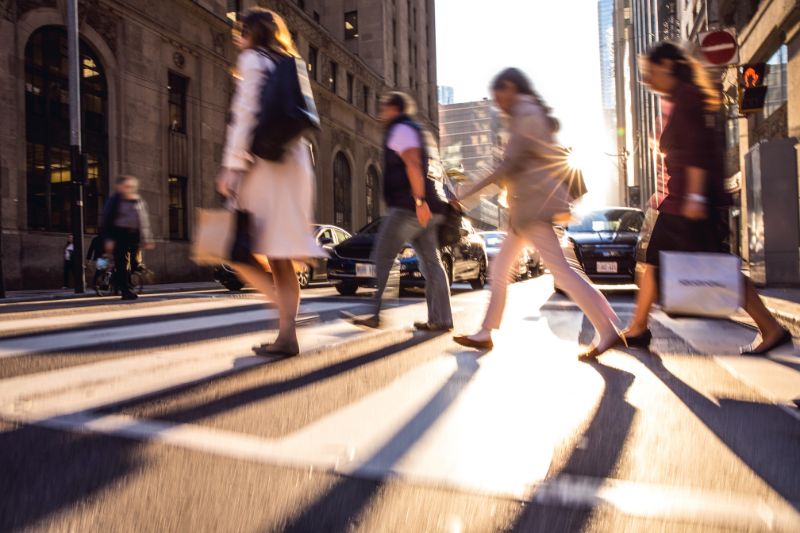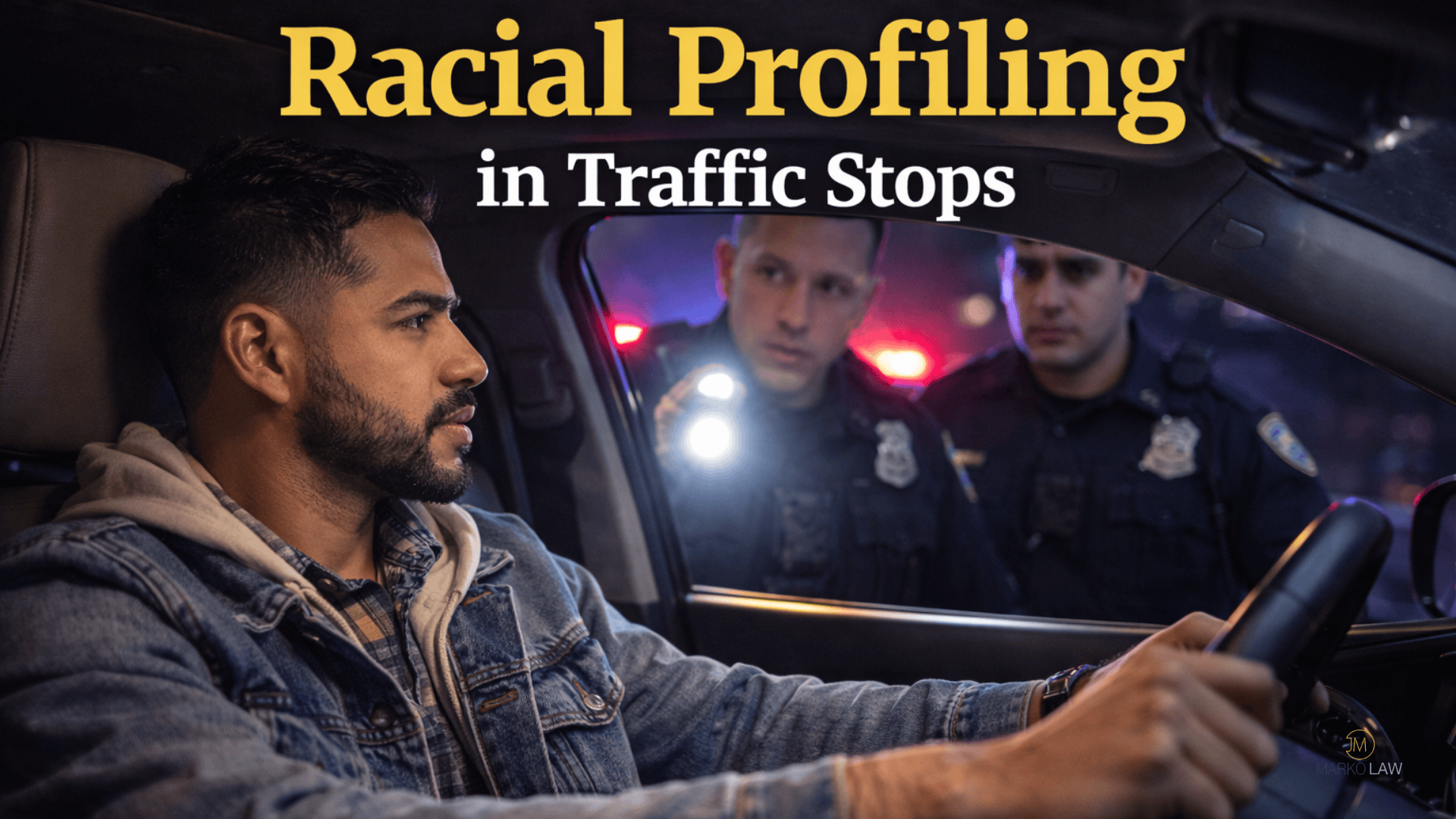You stepped into the crosswalk. You did everything right. But the car never slowed down. The screech of tires, the jolt of impact, the sirens—it all came too fast. Now you’re in a hospital bed, wondering how this happened, and what comes next.
Welcome to Detroit—where crossing the street has become a game of chance.
Every year, more pedestrians in Detroit are hit, injured, or killed. According to Michigan Traffic Crash Facts, pedestrian fatalities in urban areas like Detroit have been on the rise, driven by a deadly mix of distracted driving, speeding, poor infrastructure, and a lack of driver accountability. Drivers ignore crosswalks. They roll through red lights. They’re staring at their phones instead of watching the road. And when something goes wrong, it's the pedestrian who pays the price—in blood, in bones, in broken lives.
At Marko Law, we’ve stood with Detroit pedestrians and their families through some of the worst moments of their lives. We’ve seen the grief after a fatal crash. We’ve fought for victims left with life-altering injuries—brain trauma, spinal damage, shattered legs.
Michigan Law: Pedestrian Rights on the Road
Right-of-Way at Crosswalks (MCL 257.612)
At intersections with traffic signals or marked crosswalks, pedestrians have the right-of-way when:
- The walk signal is active
- They’re already in the crosswalk
- They’re crossing at a green light (if no pedestrian signals exist)
If a driver fails to stop, they’re not just being reckless—they’re breaking the law.
Unmarked Crosswalks Still Count (MCL 257.655)
Michigan law protects pedestrians even in unmarked crosswalks (typically where sidewalks end at intersections). Drivers must stop or yield when a pedestrian is “lawfully within the crosswalk”—meaning:
- The pedestrian didn’t dart into traffic suddenly
- The crossing is at an intersection, even without painted lines
In these cases, drivers have a duty to slow down, watch, and stop if necessary.
Pedestrian Responsibilities
It’s not all on the drivers—pedestrians also have duties under the law:
- Obey traffic signals and walk/don’t walk signs
- Don’t cross against red lights
- Avoid suddenly entering the street (“darting out”) from between parked cars
But here’s the key: a pedestrian’s mistake doesn’t automatically eliminate their rights. Michigan follows comparative negligence—meaning even if you were partially at fault, you can still recover compensation (it may just be reduced).
Who Can Be Held Liable?
Negligent Drivers
- Speeding, distracted, or drunk drivers
- Drivers who fail to yield at crosswalks or blow through red lights
- Rideshare drivers (Uber/Lyft) operating commercially without due care
- Delivery or commercial vehicle operators under tight deadlines and pressure
Employers (Under Respondeat Superior)
If the driver who hit you was working at the time of the crash, their employer may be legally liable under the legal doctrine of respondeat superior—which holds companies responsible for their employees’ actions on the job (Britannica).
This applies to:
- Commercial delivery companies
- Rideshare platforms in certain cases
- Bus and transportation services
- Any employer whose vehicle was involved in the incident
City of Detroit or Government Entities
If the crash was caused or worsened by:
- Defective crosswalk design
- Broken traffic signals
- Lack of street lighting
- Poor signage or road maintenance
Vehicle or Auto Part Manufacturers
Though rare, if the vehicle had a brake failure, stuck throttle, or steering malfunction, you may have a product liability claim. This can include:
- Manufacturer defects
- Faulty repairs
- Failed safety systems (like collision avoidance or automatic braking)
In these cases, the manufacturer or repair shop could be added to the list of defendants.
No-Fault Insurance & Pedestrians in Michigan
Here’s something most Detroit pedestrians don’t know until it’s too late: Michigan’s No-Fault Insurance law protects more than just drivers and passengers. If you’re hit by a car—even while walking—you may be entitled to powerful benefits under the Personal Injury Protection (PIP) portion of the at-fault vehicle’s policy.
Pedestrians Are Covered by Michigan No-Fault Law
Under Michigan’s No-Fault system, any pedestrian injured by a motor vehicle is eligible for PIP benefits—regardless of who caused the accident and even if the pedestrian didn’t have their own auto insurance.
You’re covered for:
- Medical expenses (hospital bills, rehab, surgeries, medications)
- Lost wages (up to 85% of income for up to three years)
- Replacement services (help with daily tasks like cleaning or transportation)
- Survivor’s benefits if the pedestrian is killed
That’s right—you could have zero insurance and still qualify. But the clock starts ticking fast.
When & How to File for No-Fault Benefits
Timing and paperwork matter. Here's how it works:
- Identify the Vehicle that hit you. PIP coverage starts with the car that caused the injury.
- File a No-Fault Application (sometimes called a “Notice of Injury”) with the driver’s insurance company—within one year of the crash.
- If the driver is uninsured or flees the scene, you may apply for benefits through the Michigan Assigned Claims Plan (MACP).
Don’t wait. If you miss the deadline, you could lose your right to tens of thousands of dollars in medical and wage loss coverage.
Real Talk: Insurance Companies Don’t Make This Easy
They may try to:
- Deny your benefits by questioning fault
- Claim your injuries are unrelated
- Delay payment or demand unnecessary documents
That’s where Marko Law steps in. We’ve dealt with every trick in the book—and we know how to shut them down.
When the City Is Responsible: Government Liability
When Is the Government Liable?
Cities and municipalities in Michigan can be held responsible for pedestrian injuries when:
- Crosswalks are faded or missing entirely
- Traffic signals are broken, mistimed, or absent
- Sidewalks or curb cuts are damaged, blocked, or poorly maintained
- Street lighting is inadequate, especially in known high-traffic pedestrian zones
- Snow or ice is left untreated, creating dangerous slip hazards
Under Michigan law, municipalities have a duty to maintain public infrastructure in reasonably safe condition. When they ignore known hazards or fail to fix dangerous conditions, and someone gets hurt—they can be sued.
The 120-Day Rule: Act Fast
If you’re injured due to government negligence, you have only 120 days from the date of the injury to notify the appropriate government agency in writing. This is required under Michigan’s governmental immunity laws.
Miss that window? You could lose your right to sue, no matter how valid your case is.
That’s why it’s critical to speak to a lawyer immediately after a pedestrian accident involving public infrastructure.
Government Immunity—and How We Break Through
Government entities often hide behind a shield of sovereign immunity, a legal doctrine that protects them from many lawsuits. But there are exceptions—and at Marko Law, we know how to carve a path through them.
Exceptions include:
- “Proprietary function” exceptions (where the city earns revenue from the function)
- “Highway exception” (includes sidewalks and roads under MCL 691.1402)
- Gross negligence claims involving city employees or contractors
We’ve handled claims against cities, counties, and state agencies—and we’re not afraid to go head-to-head with government lawyers.
Compensation You May Be Entitled To
Economic Damages
These are the real, measurable financial losses caused by your injury:
- Medical Bills: Emergency care, hospital stays, surgery, physical therapy, medications
- Future Medical Care: Ongoing treatment, assistive devices, in-home care
- Lost Wages: Time off work during recovery
- Loss of Future Earnings: If you’re permanently disabled or can’t return to your job
Non-Economic Damages
Not all damage is visible. These losses reflect the human cost of your injury:
- Pain and Suffering
- Emotional Distress
- Loss of Enjoyment of Life
- Permanent Disfigurement or Disability
- Loss of Independence or Mobility
If a loved one was killed in a pedestrian accident, you may be entitled to:
- Funeral and burial costs
- Loss of financial support
- Loss of companionship, guidance, and affection
Punitive Damages (In Rare but Severe Cases)
In instances of gross negligence or reckless disregard for life, Michigan courts may award punitive damages. These are designed to punish the wrongdoer and deter future misconduct—think drunk driving, hit-and-run crashes, or repeat offenders with a known history of dangerous driving.
If You Were Hit, Don’t Stay Silent
You were just walking. Going to work, heading home, crossing the street near your kid’s school. You didn’t ask to be thrown to the ground by a car, left broken and bleeding. But here you are—hurt, confused, and facing a road you never expected.
We see you. And we want you to know this: You’re not powerless. You have rights. And we will fight to enforce them.
Whether you were struck by a distracted driver, left in the street by a hit-and-run, or grieving a loved one who never made it across that crosswalk—you don’t have to go through this alone. Michigan law is on your side. And so are we.
Contact Marko Law for a Free Case Evaluation
📱 Phone: +1-313-777-7777
📍 Main Office: 220 W. Congress, 4th Floor, Detroit, MI 48226
🌐 Website
🔗 Our Team
📣 Verdicts
🎙️ Cases Gone Wild Podcast









.svg)








